Are You An INFJ or an INFP? How to Find Out!
“Am I an INFP or an INFJ?” This is a question I get every day as an MBTI® practitioner and blogger.
The reason this question comes up so frequently is because there are so many unreliable online tests out there. These knock-off personality quizzes claim to be as accurate as the official Myers-Briggs Type Indicator®, but they are lacking the reliability and validity testing that went into the official MBTI®. As a result, numerous people are being mistyped or getting different results each time they take the test. The most common mistype to come from these online tests is the INFP/INFJ mistype.

Estimated reading time: 8 minutes
Take my INFJ or INFP Test! Scroll Down After Taking the Test to Read the Rest of the Article
Why are so many INFPs and INFJs mistyped?
The majority of online tests focus on the letter dichotomies (E or I, S or N, F or T) without considering the cognitive functions. Because of this, a very slight preference towards the P dichotomy or the J dichotomy could change your entire type. This isn’t how personality typing should work.
INFJs and INFPs share zero cognitive functions. Cognitive functions are like mental tools that you have at your disposal at all times. We all use different tools more readily, and with different levels of aptitude.
Are you confused yet? Let’s try to simplify things!
Let’s start by taking a look at the different cognitive functions for the INFJ and the INFP.
INFJ Functions:

INFP Functions

If you look closely, you can see that the INFJ uses introverted intuition (Ni), extraverted feeling (Fe), introverted thinking (Ti), and extraverted sensing (Se). The INFP uses introverted feeling (Fi), extraverted intuition (Ne), introverted sensing (Si), and extraverted thinking (Te).
In short, there is not one function that these two types share.
How can I tell if I’m an INFP or an INFJ?
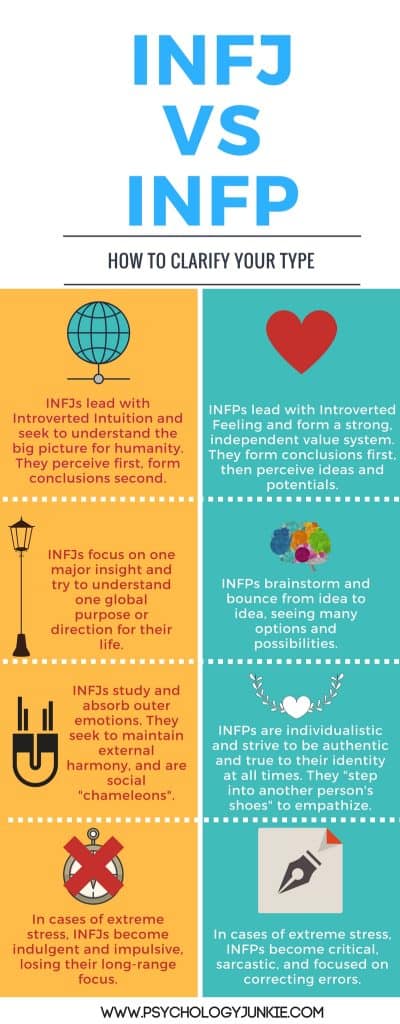
How INFPs and INFJs Use Intuition
INFJs lead with introverted intuition. This is their dominant function. Their #1 favorite driver. They use it so much that they probably don’t even realize they are using it.
More than anything else in the world, INFJs are going to look at patterns, perspectives, and the big picture.
They privately consider the purpose and meaning of life, and analyze human patterns and behaviors. They like to discard possibilities until they come to the one most likely possibility for the future.
For the INFJ, finding “the one” idea is the goal.
INFPs use Extraverted intuition. Rather than looking for the “one” idea, INFPs enjoy navigating dozens of ideas and possibilities. Their minds generate imaginative connections, futures, scenarios, and dreams on the fly. There’s a wish to expand possibilities rather than to narrow them down.
Unlike the INFJ, who focuses on discarding possibilities until the right one is reached, an INFP adds MORE possibilities to the picture.
They can see one thing and extrapolate numerous ideas and connections from that one thing. Brainstorming and bouncing from idea to idea is natural to them. Their intuition is like a tree with short roots but broad branches reaching out in many different directions. It has lots of breadth, and extrapolates many connections.
How INFJs and INFPs Use Feeling
INFJs use Extraverted Feeling. This is their 2nd favorite, or auxiliary function. It balances out their intuition. INFJs notice and absorb the moods and emotions of the people around them. They usually know how to alter their behavior to make everyone feel good. Smiling, laughing, getting into a “vibe” with someone else; this is something that comes naturally to them.
INFJs are often called “social chameleons” because they can so easily adjust to the people around them. In fact, some INFJs risk losing themselves in the aura of the people around them, forgetting their own individual sense of self.
For the INFJ, external harmony is key. There’s a natural tendency to adjust to others.
INFPs use Introverted Feeling (Fi). This is their favorite function, the one they use without having to try.
INFPs constantly analyze how things fit in with their value system. What feels right to them? What matters to them? What do they stand for, even when everyone else is going a different direction?
INFPs are individualistic and autonomous. They don’t want to be influenced by the external “mood”.
For the INFP, inner harmony is key. There is a natural tendency to march to the beat of their own drum and not change or “chameleon” for others.
INFPs are constantly in check with their conscience to determine if something is “right” or “wrong.” They step into other people’s shoes to try to understand how they would feel in their position. This is called “mirroring” emotions.
INFPs will rarely alter their ideals or identity to “smooth over” things in the outer environment. Internal harmony and authenticity will always be more of a priority than external harmony.
How INFJs Use Thinking
INFJs care about things making sense in their own minds. While on the outside they can seem empathetic and friendly, inside they have a more skeptical, analytical side.
For INFJs, logical consistency is important and they can easily play devil’s advocate if they’re around people who won’t take offense to it.
Categorizing and sorting out information is a lot of fun for INFJs! They enjoy understanding the principles and underlying frameworks of how ideas and theories work. They learn for the sake of learning; but they don’t typically feel comfortable “talking out” their logic with others, because they worry that it will seem critical or their thoughts won’t be refined or accurate enough.
How INFPs Use Thinking
INFPs use Extraverted Thinking, but it’s in the inferior position for them. Extraverted Thinking focuses on externalizing logic to make sense of things, or organizing the outer world to achieve a specific goal.
INFPs like the idea of to-do lists, goals, and organizing the world around them in a way that makes sense. But they tend to feel uncomfortable doing it. Instead, priority is given to the world of Feeling and Intuition; values, ideals, imagination, exploration, conviction.
As INFPs age and mature, they tend to become more proficient with Extraverted Thinking. They become more effective at giving constructive criticism, offering logical advice, or organizing their world in a productive way. But this usually takes time and practice and they will feel tired afterwards, like they’ve just expended a lot of mental energy.
During moments of stress, INFPs may fall into the grip of Extraverted Thinking and become more critical, bossy, and focused on organizing and “fixing” everything in their environment.
How INFJs Use Sensing
INFJs use a process called Extraverted Sensing, or “Se” for short. Extraverted Sensing is all about acknowledging what’s tangible and relevant, rather than trying to figure out what’s going on beneath the surface.
Because Se is inferior for INFJs, it tends to take a backseat. They can easily feel overwhelmed by noise, sights, sounds, tastes, and textures. The concrete realities of life sometimes feel suffocating, particularly when compared to the compelling world of intuition.
With age and maturity, INFJs become more proficient with Extraverted Sensing. They become more effective at handling details, reacting to spontaneous events, and enjoying the moment rather than fixating on the future.
During extreme stress, INFJs may fall into the grip of Extraverted Sensing. When this happens, they become more impulsive, pleasure-seeking, and hedonistic. They may shop carelessly, overeat, over-exercise, lose their temper, or do something else in an impulsive burst of energy that they wouldn’t normally do.
How INFPs Use Sensing
INFPs use a process called Introverted Sensing, or “Si” for short. This function is all about tuning into the past, in all its personal nuance, and using the memories to instill something significant or helpful into the present moment.
When INFPs use Introverted Sensing they reminisce, recall age-old wisdom, or revel in routines and traditions that give them a sense of groundedness.
Introverted Sensing is a valued function for INFPs. They tend to have a playful, creative, childlike energy with it. They may enjoy commemorating their memories in creative ways; through specific playlists, poetry, scrapbooking, songs, or artwork. They may also develop special feel-good routines that comfort them during difficult moments.
Receiving love and support in the world of Introverted Sensing is crucial for INFPs. It means a lot to them when others value and honor their traditions or routines or take an interest in their stories or life experiences.
What Do You Think?
I hope this helps you to understand the real differences between the INFP and INFJ! I also hope this helps you to figure out if you are one of these types. If you’re still unsure what your personality type is, you can take my INFP or INFJ questionnaire here.
Tap into even more discoveries of your personality type in our eBooks, Discovering You: Unlocking the Power of Personality Type, The INFJ – Understanding the Mystic, The INTJ – Understanding the Strategist, and The INFP – Understanding the Dreamer. You can also connect with me via Facebook, Instagram, or Twitter!
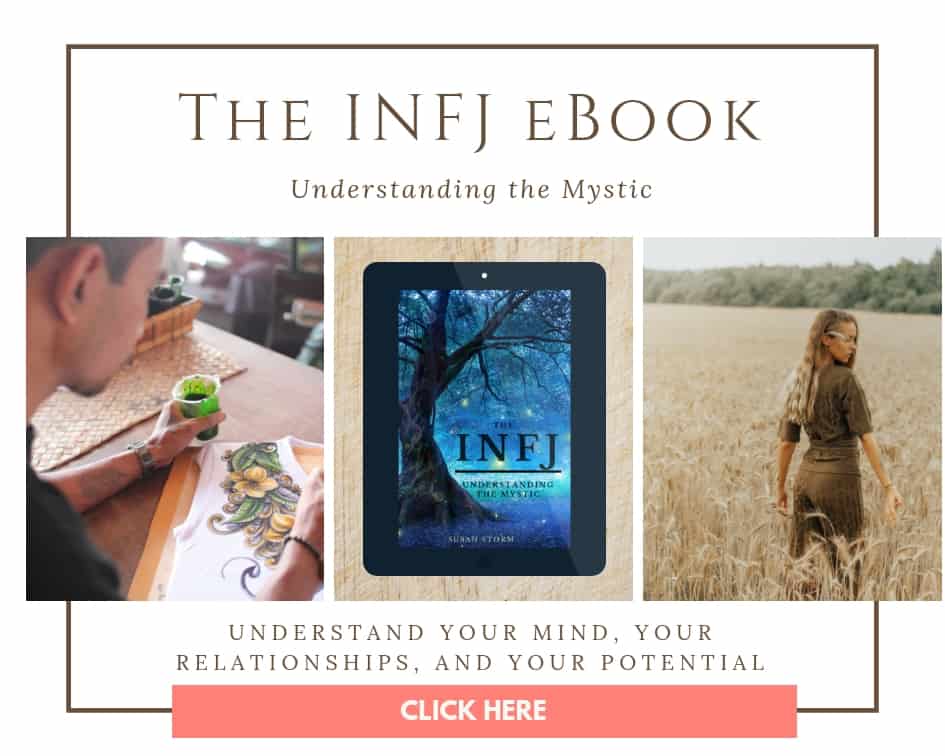
Sources:
There is a lot of helpful information about these two types if you are still seeking clarification. Check out these links!
References:
Building Blocks of Personality Type by Leona Haas and Mark Hunziker (2006, Eltanin Publishing)
Understanding Yourself and Others® An Introduction to the Personality Type Code by Linda V. Berens and Dario Nardi (InterStrength, 2004)
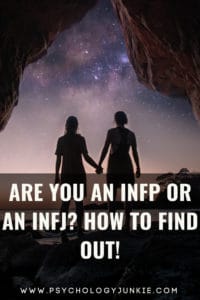
Get Your Free INFJ eBook
As a thank you for subscribing to my newsletter I will send you this free eBook PACKED with self-care tips, creativity hacks, and more! You'll also get a 3-day email course for understanding your personality type better!







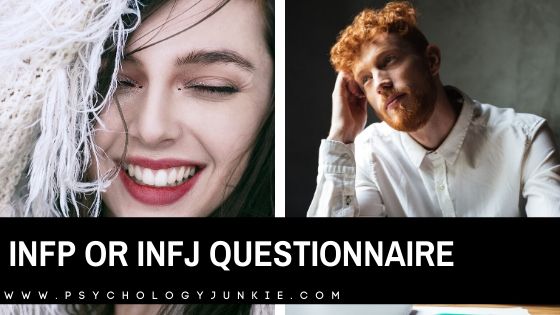

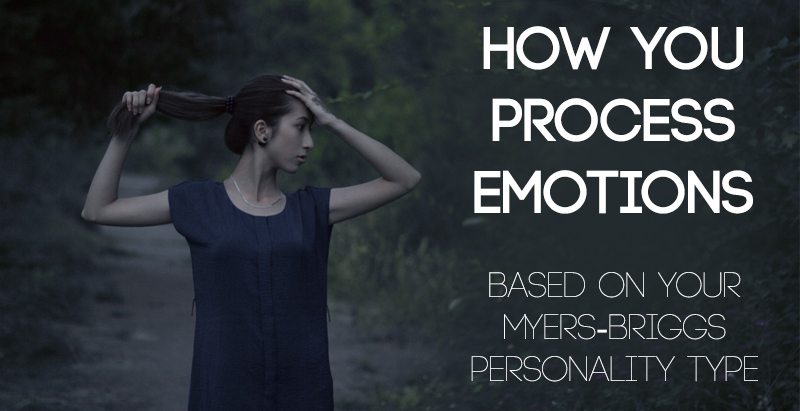
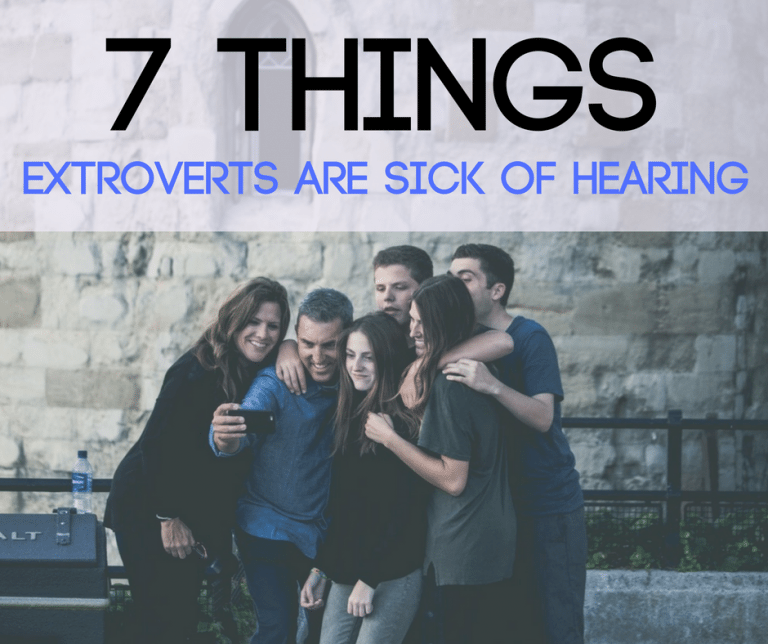
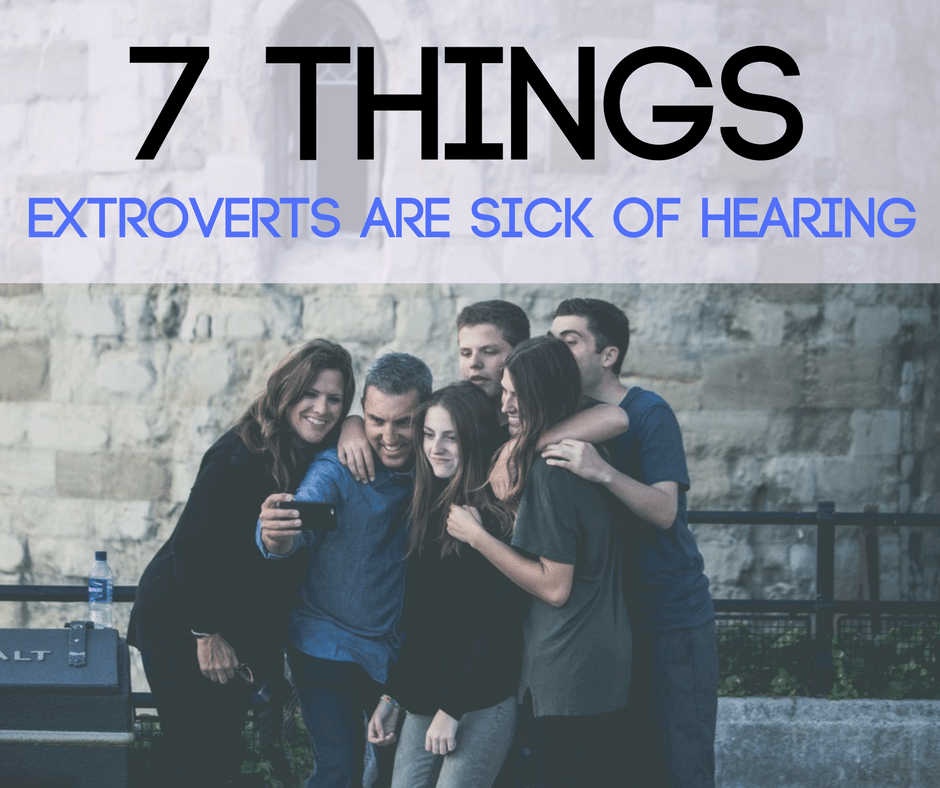
This was a great break down of the two personality types and side by side comparison. Funny, I just watched a clip that compared the INFJ and the INFP a few minutes ago. https://www.youtube.com/watch?v=6JR3_OtpJe8
Thank you!! I’m going to watch the video right now 🙂
You’re welcome! 🙂 It was interesting seeing the two types interact and having their actions explained.
Yeah, definitely! I enjoyed the video. Thanks for the link!
This article, I think, has finally made me come to the conclusion that I am an INFJ, after many years of thinking I was an INFP. I’m just a wanna-be INFP. Thank you!
Thanks so much for your feedback! I have struggled with wondering if I’m an INFP or an INFJ for a long time myself – and it was only in the last year that I determined I was definitely an INFJ. It’s very hard sometimes to determine the difference between Fe and Fi, Ne and Ni, etc,…I’m so glad it was helpful!!
It made it harder. I’m more confused now… I took sever tests and i got 3 times INFJ-t AND 2 times INFP. Now that i read your article makes it 100 times harder to decide because i found characteristics from both (within your arguments). Now which one of them am I?…
You know what, I think I need to re-write this article, because it IS really confusing! It is really hard to understand the difference between Fe and Fi, Ne and Ni right away. Here’s what I’d tell you right now: Are you focused more often on one main idea for your life very intensively? Or do you see lots of ideas in the OUTSIDE world that you like to talk about? The Ne and Ni difference lies there a lot. While I can be inspired by many outside ideas as an INFJ, I mainly have one or two BIG ideas that I work through very intensely on my own. I don’t necessarily share them with everyone and talk about them too much, but they’re always there and I’m very happy when I can be alone to focus on them. Ni types often have one or two obsessions going on that last quite a while. Ne types can have obsessions, but it’s often more broad in scope. And they’re less likely to hone in on one big obsession/idea than have their hands in lots of ideas and explore them more externally. Ne is broader in scope, Ni is more intense and focused in its scope. Ne types are full of a million ideas and can jump around a lot, where Ni types will be more focused on one main idea and delve really deep into it.
Fe and Fi is another difference that’s hard to explain sometimes. Fe users are very aware of external emotions and affected by them. Fi users are extremely aware of their own emotions and values, and externally may seem a little more reserved about their emotions and feelings because their feeling is introverted. So INFPs extravert (show) ideas and possibilities, INFJs extravert (show) awareness of others feelings and focus more on that in the outside world. INFPs like time alone to process their feelings, INFJs like time alone to process their ideas. Of course, they both like time alone for both, this is where it gets confusing. But INFJs are very less aware of their own feelings than INFPs are. INFPS know exactly what they’re feeling all the time. INFJs are often very confused about their feelings and have to ‘vent’ to understand them. Venting lets them put their feelings outside into the external world and then they feed what they hear back in through Fe. Does that make sense? So Fe users are more likely to ‘vent’ their feelings, where Fi users aren’t as likely. They might cry or have emotional reactions the same, but Fi users don’t need to talk it out as much.
I hope this helps!
I’ve been struggling to figure out if I’m an infj or infp for a while now. I originally tested as infj and related to it enough to right a paper about it but recently I watched a video about 20 things INFPs experience and related to almost all of them. I’ve been reading these articles about how to tell the difference and come out with different conclusions each time. Explaining each function helped me understand the two types better but I still feel like I can experience both at different times. Now don’t take me as some prick who thinks he can be two types because I have really thought about this for a while. Is it possible that I could experience functions from each type in certain situations or am I just subconsciously lying to myself?
Excuse all my typos it looks like whenever I wrote the letter ‘I’ in a word it got deleted. I typed it from my phone so I don’t know haha
Hi Zach! I definitely don’t take you as some prick who thinks he’s two types, no need to worry about that! It is a VERY confusing thing to really narrow down your type to one out of 16, and I completely relate to you on that. In fact, at some point I really want to write this article to make it clearer because I feel like I didn’t do a fantastic job of it here. I just am waiting for the time to come back here and fix it. Here’s the way I see the MBTI: We all have access to all 8 functions – Fi, Fe, Si, Se, Ti, Te, Ni, Ne. We have four that are preferred. The other four exist as shadow functions – and that’s a whole other can of worms that I have yet to even try to write about or explain. INFJs and INFPs have a hard time differentiating between themselves because they are both idealists – they both use intuition (albeit different kinds) and are strong feelers (albeit different types of feelers). I myself struggled for a long time to figure out which one I was! And there are a lot of things about INFPs that I relate to even though now I definitely identify as an INFJ and know that’s what I’ve always been. INFJs and INFPs are going to share a lot in common because they’re both idealists and introverted ones at that. So yes, you can definitely utilize the same functions as an INFJ or an INFP, the goal is to figure out which ones you use the most. A lot of times what helps is to look at your stress reactions. INFPs when they are ‘in the grip’ of chronic stress veer into Extraverted Thinking. They become harsh, critical, and obsessed with ordering the outer world. They become more like unhealthy ESTJs (I know most INFPs would hate this idea – again, this is only if they are under chronic or extreme stress). INFJs when they are under extreme stress fall into the grip of their inferior function – Se (Extraverted Sensing). They become more like unhealthy ESTPs. They may be really indulgent in sensory stimuli – overeating, overusing porn or sex, cutting, listening to really loud music, etc,..
So stress reactions are a great way to figure out your type. When you have those moments where you’re thinking ‘wow, I am not myself, this is not like me’ do you feel like you come across more directive, harsh, critical of others? Or do you feel like you become more obsessed with sensory details – binge eating, alcohol, watching too much tv, etc.,? This is where you’ll see a big difference between INFPs and INFJs.
INFPs are also very good at identifying their emotions and don’t need to ‘talk them out’ as much. They understand their emotions already because they use Fi. INFJs may need to talk out their emotions more because they use Fe and aren’t as aware of their own emotional state. They FEEL their emotional state – very well – but they don’t understand it or know how to sort it out or identify their feelings. This is a big difference between the INFJ and the INFP because INFPs are excellent at identifying their own feelings. INFJs are excellent at identifying the feelings of others. Of course, there are exceptions to this rule and times when an INFJ can identify their feelings, but as a general rule this is the case.
I don’t know how helpful this is! There’s a lot more I could write, but I have to run now and I hope this has been somewhat helpful to you! Let me know!
That did help a little more thank you. Now is it a good idea to ask family and friends about what they feel I extrovert more or to find out what I do more in stressful situations? The reason I ask this is because since I do not know which type I am I tend to think about all this personality stuff in these situations of stress, and instead of dealing with them instinctively I try both ways and attempt to determine which one feels most natural. I hope this makes some sense because I do have a hard time explaining myself (pretty sure that’s a characteristic of both types).
I’m just confused because I honestly do BOTH reactions (in all of your above examples) all the time. For example, I am harsh and overly critical of others when I’m stressed, and then I go grab food and alcohol to calm down. I do both very instinctively. At the same time, I don’t ever OVER-eat or indulge too much in drink…though I absolutely go crazy if I can’t have at least one food item and one alcoholic drink that I want. What does that mean? I’m not overweight and I’m not an alcoholic, but I absolutely love very specific “stress-foods” and alcohol. Again, I also react harshly and critically.
Another thing I keep getting confused by is that I am very aware of my emotions at all times, yet I LOVE talking about them and “venting” as well. Does this mean that maybe I’m not as aware of my emotions as I think? Basically, the way I vent is: “I’m feeling incredibly sad and lonely because I feel like my friends don’t truly care about me…” I’ll jump right to what I already feel. I’ll tall anyone who will listen my emotions, and I never come to a different conclusion at the end (such as “oh, I actually feel happy rather than sad! ” or anything like that) but I DO feel much better after venting because it’s nice to just have someone listen and either agree or talk you down from the ledge.
Basically, your article is VERY clear to me, it’s just that I am nearly 100% both FJ and FP…?!?! (Except on the negatives where you list what each one doesn’t do or can’t do…)
You know, I completely relate to you even though I’m the one that wrote this post! I think I need to re-write this so that it’s a little bit more clear. I ran into the same problem for years (“Am I INFP or INFJ – I feel like I do all these things!”). I think that you can be an INFJ who has a slightly higher Fi level than usual – if you take a cognitive functions test it can give you a lot of background into where your cognitive functions lie. While I agree with a lot of the aspects of the Myers-Briggs theory, I do believe that the development of the cognitive functions can vary from person to person – so while you may be an INFJ that has 80% Ni, 60% Fe, 20% Ti, and 10% Se (just theoretically speaking) maybe you have 40% Fi development as well which gives you a certain understanding of your feelings, but you also like to talk them out because you predominantly use Fe and it helps you to sort it out more clearly. Does this make any sense? If you haven’t before, I would maybe suggest taking a cognitive functions test to see where you measure out in that respect and maybe that’ll help you feel more sure of your type.
I have also read that the judging function means that others see the more organized side of you as you extrovert more of a “work before play” kind of attitude while the perceiving function displays more of an open attitude to others. I was just wondering if this is true because if it is the case then I think I am an infj. I’m sure it’s much more complicated than that though.
Originally when I tested I came out as intj, but I knew something wasn’t right. After that I tested as infj then infp, but then infj again. With that I also found some info things that do resonate with me that a lot of other infjs don’t seem to see or have (or if they do it’s rare), even though I know I myself am an infj.
I made a list below of some of the things I noticed about myself personally:
1. I express myself well when it comes to writing. I have too many notebooks and pens to count and I feel like there’s not enough pages in the world to full my thoughts.(infj/infp)
2.I mentor and advocate to those around me, but in the end I leave it up to that person on whether or not they want to make the change for themselves.(infj)
3. I think about myself, I can actually be quite selfish in certain situations thinking how does this effect me, but I ultimitly think of the bigger picture and stay humble when it comes down to it depending on the situation.(infj/infp)
4. I know myself well when it comes to some of my emotions, but I express said emotions better when I am on stage playing a character, dancing a piece of work, writing or singing a song.(infj)
5. I don’t mind being center stage for some situations if need be or if I deserve said spot, but I like playing minor or supporting roles.(infj)
6. I take rejection or being ignored very hard, but I keep it too myself (infj/infp)
7. I question both “what if” &“what could be” (infj)
8. Id rather work and do what I love and be poor then do something that compromise all my morals and make millions at a job I hate.(infp/infj)
9. I like to communicate in other languages, travel and explore new things.(infp)
10. I take time to get to know myself and soul search.(infj)
11. I love trying new things even though I know what I like, I’m always up to explore.(infp)
12. I can be every emotional, but I try to control said emotions.(infj/p) I can be warm and optimistic, (infp) but also be cold and private.(infj) Again this depends on the situation as well.
13. I like to take care of people, but I also know that i need to take time to take care of myself and I give myself time to do so.(infj)
14. I like to see the best in people even when they are at their worst(infp), but I do judge based off of gut feeling, logic, and past vs present actions (infj)
15. I do like to plan things (infj), but I do also like to be spontaneous(infp).
16. Im good at neogociation and compromise so that way everybody gets what they want in certain situations(infp) or helping in making a final decision also depending on the situation (infj)
17. When upset given the situation I either become critical/harsh/ cold (infp or I delve into sensory pleasures(infj), once again it depends on the situation or what’s going on.
18. Im very loving towards animals and people and will fight when I see injustice going on (but I’m pretty sure all infps and infjs are like this tbvh)
I just thought it was odd am I a strange anomaly? Its like I’m 60% infj and 40%infp..idk I’m trying to understand it but the more I try the more I get confused. Do you have any comments?
Hi! I just read your comment and can relate to almost everything. I also feel like 60% infj and 40% infp… Haha…
Hi! I just wanted to let you know that every point you had was clearly accurate for an INFP. I know that many could be accurate for INFJ as well. However, I am certain I am an INFP and I identified with every single one. Some of your points you only put INFJ but were clearly INFP traits. Such as 1,4,7. Anyhow I hope this helps with anyone soul searching!
I honestly identify as both? I’m still quite confused about what my type is. When you wrote in the comments about dealing with stressors, I’m DEFINITELY an INFJ in that aspect. Plus, I’m always focusing on how other people feel, the mood of the room, and I’m known to mold myself almost to match my surroundings. But I feel like over time I’m becoming better at distinguishing how I specifically feel and what I value, which is usually after venting in journals, long periods of reflection, etc. I usually feel like I’m going through a 24/7 identity crisis because I always seem to be absorbing others’ values, belief systems, and emotions. The thing is though, I’m not very expressive with emotions and usually keep a poker face which may make me an INFP in some aspects.
I’m also prone to losing touch with my surroundings and being extremely spacy and ungrounded because I’m so involved with my thoughts.
Hey Susan!
Just to say thank you for your article. 🙂 Still I know for sure it’s very tricky when you’re delving into describing those functions. I’ve been doing this recently and I thought I wasn’t going to get out of this mess. But I finally did and your article was a bit the “final act”.
For a while, I thought indeed I was INFP but I couldn’t fit perfectly. INFP’s seemed to have strong values that they held outside any outside influence (which is cleary Fi) while my desire was to be in harmony with others and if there was a “conflict of values”, I would adapt myself to the other person for the common good. Also like you said, they are very aware of their emotions while I’m not really. If someone asks me how I am doing, I always respond “I’m fine” because I have hard time knowing what I’m feeling (and I prefer to avoid letting the other wait for just a simple question).
Also the fact I wanted to be attuned to my physical environment made me doubt about being INFP. For a short while, I drifted towards ISFP but then I realized my “S” wasn’t “strong enough” to be considered as ISFP. Then I’m not the kind of person to live in the present and this is not really ISFPish… (this is besides kind of a problem INFJ have to deal with I think)
Anyway, again thank you for your article Susan. 🙂
Sorry if I’m answering for Susan but I felt the urge to answer you. ^^
Unfortunately, I think it’s not always black and white… But I think you need to focus on what you are most of the time. For example, for your 17th point, are you more often critical or delving into sensory pleasures? I know it can depend on the situation but you should think about what you’re more prone to be or to do. But from what you’re said, you’re more likely to be INFJ.
Also, for your 9th point, I could be wrong but INFJ’s can be that way as well. 🙂
Thank you so much Susan, your article helped me to finally identify myself as INFJ.
I can totally correlate with your descriptions of the INFJ functions!
I’m so glad! Thanks so much for letting me know! It’s always fun to meet a fellow INFJ 🙂
Thank you so much for this article! I’m new to mbti. Took several tests that did just what you said above. I joined a FB group, for INFJ’s, but I still get confused because of the input of other types.
I’m reading your blog, and I’m convinced I am a strong INFJ! LOL
Thank you for giving me hope in my insanity. 😀
Lotus
Oh, I’m so glad this was helpful! I’ve been thinking for a while that I need to re-write this post because I haven’t felt it made things very clear at all. Your comment encourages me, and I’m glad it has done some good for someone. I really appreciate you taking the time to write, and I hope you enjoy knowing your type for sure!
Hi I’ve taken several tests and studied the functions from websites/books and what not and I’ve typed as both INFJ and INFP. I have leaned more towards INFJ but I also have social anxiety disorder and INFJ’S are commonly known for being one of the most extroverted introverts and I don’t feel that I’m extroverted in that way at all. Do you think that my Fe could be broken somehow like not be able to function the way it should because of social anxiety disorder? Also is Fe known for being not easily detected in one’s self? Because I’m still having a hard time wondering if I’m really an Fe user or an Fi user.
This was really interesting and insightful. Thank you!! It cleared up a lot of questions I had. After reading your descriptions, I have come to realize I am truly a 50/50 mix of INFP and INFJ personality traits: introverted feeling and extraverted intuition like the INFP but introverted thinking and extraverted sensing like the INFJ. But I often relate more with what I read about the INFP personality. Thanks again!
Thanks for reading this! I am so glad you found it helpful! This is a post I keep trying to get back to to re-write because I still feel like it’s SUCH a confusing type to determine. I’m glad you found some clarity with it, though 🙂
What is the differences between an INFJ and an ENFJ? (My “love match” is the ENFJ, according to this Website – truity.com/test/personality-type-love-match -, but I have big difficulties to distinct my type being INFJ and the ENFJ after further readings on 16personalities.com.)
Best distiction is the I in INFJ and E in ENFJ. INFJ is an Introvert but ENFJ is an Extrovert. INFJ find it difficult to make friends or initiate conversations while ENFJ makes friends very easily and is good at initiating conversations.
Hi, I liked your article, but I’m really no better off than I was before. I’ve always thought I was INFJ, but now I’m considering INFP. I’m pretty sure I’m an Ni user, because I tend to have one idea of focus for a long time. I do have lots of random ideas develop out of seemingly nowhere, but 99% of the time they have to do with the bigger idea that I have a slight obsession with. For example, sometimes I’ll become really deeply invested in a story I’m writing, or another project I’m working on and I’ll constantly be coming up with ideas to use within the story/project. I also can’t rest until I’ve come to a definitive conclusion about something (like right now) and if I have a question, I can’t stop thinking about it until I have found the answer. This goes for projects too. When I become interested in something, I tend to see it through to the end; I don’t just start a project one day and then completely stop working on it because I’ve found something I’m more interested in. I’m pretty sure this is mostly Ni, but I’m not entirely certain.
I’m also pretty split on Fe and Fi. On the functions tests I always score about 60% on both. I rarely talk to people about my own feelings; I usually just prefer to internalize them. I tend to be distrustful of people, and only trust my emotions with myself, though I do sometimes write them down – it’s kind of like venting to a piece of paper. But when I’m alone, emotions are usually the last thing on my mind. Unless I’m under a lot of stress, I’m usually thinking about ideas rather than feelings. Despite this, I really relate to INFJs in that I’m never truly myself around other people; I often just act to meet others’ needs. Different people all have different ideas of who I am, but only I know who I truly am.
I also have pretty developed Ti, and really undeveloped Te. When it comes to logic, I like doing things my own way. I absolutely hate having to memorize and limit myself to external systems like the scientific method and other formulas. I’m the same way when it comes to any kind of structure, like when writing an essay. I pretty much hate any kind of system that attempts to tell me how to express my thoughts and ideas. Sometimes I even feel like more of a thinker than a feeler, especially around my INFP mother. She’s extremely sensitive and emotional, to the point where I sometimes get annoyed with how irrational she’s being.
When I’m under stress, I tend to watch TV or read to try to distract myself from whatever is bothering me, but I can also be grumpy and overly critical of other people if I’m stuck in a social situation while I’m stressed out. I also have a more direct communication style, which I’ve heard is usually more accociated with INFJs than INFPs. For example, if I’m running low on groceries, I’ll say, “Hey, can you go to the store?” rather than “Hey, someone needs to go to the store”.
I also have my doubts about being an INFP because my Si is the least developed of all my functions. Quite frankly, I don’t care about the past or nostalgia at all, and I especially hate rules and traditions. When people start talking about past memories, that’s when my brain starts zoning out. I enjoy experiencing new things, like riding new rides at a theme park, or visiting cities I’ve never been to before. Above all else, I can’t stand watching a movie I’ve already seen. It’s no fun if I already know what’s going to happen.
I might just be overanalyzing this too much, but it’s really frustrating to me that I can’t come to a definitive conclusion here. Any insight would be greatly appreciated!
I have a theory that even though people have one dominant type, it’s too narrow to say that there are exactly 16 types of people. Life is complex, situations are complex. I have always tested INFP. I don’t doubt that’s what I am because I do think of many ideas and have an easier time talking about my intuition than my feeling. HOWEVER, I have found the INFJ descriptions and stress lists (loved that post!) to be very insightful to my life. They aren’t wrong even if some of those shadow, inferior, etc. things are supposed to play out differently. I do get really easily overwhelmed by sensory stuff and have issues that come out in the INFJ descriptions, not INFP.
To make it even more complex. I know INTP isn’t my dominant type, but it’s also been super insightful because I do try to take everything in life and fit it into one narrative. I think I got this strong Thinking trait from my dad and his aims for me. This type doesn’t define me, but I definitely have these qualities and sometimes these stresses are the ones that get to me.
So I’ve found it incredibly helpful and eye opening to let go of the need to type myself strictly as one type. I have found that 3 types (2 major and 1 minor) tend to more fully describe all the people I’m close to. Maybe those secondary and tertiary functions make it so we relate to 3 types? I don’t know. I’m not nearly as informed as Susan on this, but for my hobby type watching and in trying to understand myself, I think a willingness to consider that you don’t have to fit one type only is a good way to go. There are a lot of different kinds of people in the world, a lot of situations that impose various stressors and in those situations, different nuances of who we are become more evident. I equally relate to INFP and INFJ experiences.
Hi Susan,
I have done a few free MBTI tests and I keep getting either INFJ or INFP. After reading this article I have discovered that some of INFJ’s characteristics (inferior extraverted thinking) and INFP’s characteristics (inferior extraverted sensing) match me, so I feel like a personality hybrid… Could you either recommand a reliable free MBTI test or help me figure out what personality suits me best, please?
Thank you!
Ps: I love your blog ?
Oh, I completely feel your pain! I have struggled with this for a long time, and it has only been recently that I have truly found that I am an INFJ for sure. I need to re-write this post at some point and make it more clear. As an INFJ you use all the same functions as an INFP, but they are your “shadow” functions. The same goes for an INFP. They use all the same functions as an INFJ, but they are also in the “shadow” realm. This means that in some ways we will identify with both sets of functions, but we usually will prefer one over the other. I highly value Introverted Feeling, but I know when I’m in my day-to-day life I use Extraverted Feeling more. I love brainstorming from time to time and using Extraverted Intuition, but on a more regular basis I prefer Introverted Intuition because I like to focus more on one goal at a time. INFJs aren’t very good at multi-tasking, whereas INFPs are much better at multi-tasking. INFJs like to stick with one project and finish it before starting another project; INFPs tend to enjoy working on more projects at once. These are just a couple of differences. I will try to re-write this post at some point to make it clearer and more easy to understand. Thanks for reaching out to me! I’m so glad you’re enjoying the blog!
I am an infp and my identical twin sister is an infj, so noticing the subtle differences between us is more obvious. There are a moments that stand out to me, and hopefully others here can see themselves reflected in either me or my sister in this experience and it’ll help them figure out they’re personality.
Things we have in common:
We’ve always had a deep emotional connection. We love history, self-reflecting, and going on insanely long discussions on spiritual things or on the human condition/experience etc. We have a strong sense of right and wrong. We both feel things very deeply and empathize quite well with others.
Differences: I was drawn more towards writing because of the idea of telling stories with emotions everyone feels. My sister was drawn to poetry as a way of expressing deep-set emotions without literally saying what was wrong. I’m more overtly passionate and my sister is more internally passionate. I express my passions quite unintentionally when the topic comes up, my sister is more reserved and rarely shares these with others. I was a quick-tempered blubberer as a kid (only with our friends of course, I’m still and introvert) and my sister always kept her cool though every once in a while she’d have a melt-down (these are quite a sight). I remember she said she kept her emotions in in order to keep the peace. That you can’t express every little thing that pops into your mind because it’ll make some people uncomfortable. In my opinion, expressing things to others, even if there were differences brought people closer. Bonded people. She felt that they divided people.
I think our most obvious difference is expressed well in a personal experience. In 4th grade, we had a friend who was bossy, dictatorial and mean. She would constantly threaten to “not be friends with us” and would suddenly stop talking to us without any warning and would offer no explanation no matter how much we asked. My sister and I were never in the same class in elementary school. So in 3rd grade I had this friend in my class. She basically bossed me around and I tried my best to appease her. When she entered my sisters 4th grade class the next year, my sister reacted differently. At some point, my friend pulled the typical “silent treatment.” When I found out, I asked my sister if she had apologized enough to our friend. My sister just stared at me and said she wasn’t going to do that anymore. She didn’t want to be friends with someone who didn’t want to friends with us. “What?” I thought. “But we’re friends. We’ve had good times together!” I knew he was right but my desire to keep this magical thing called friendship alive was a strong pull. My sister kept her conviction even when our “friend” got more rotten than ever and started bad rumors about us. I also relented and didn’t try beg for her friendship even though I desperately wanted to.
Many times my sister has, seemingly out of nowhere refused to do something, or determined to do something based on her sense of right and wrong. She has difficulty explaining why until after a long while because simply put, she “just knows.” But her decisions do come after a long time of overthinking and analyzing, it’s just that these thought processes are never verbalized to me. I simply see her taking action which can lead me to misguidedly think she’s being rash. I tend to also overthink things for a long period of time but even when I start taking action, I’m not certain if I’m doing the right thing. I just “feel” like it’s right. So I’ll go through a process of tossing out hints and seeing what people say before my true intentions are ever exposed. I’ll know if it’s the right decision when I reap the consequences. My sister knows it’s right decision before reaping the consequences.
Hope this helps!
It helped a lot! This is the final piece that got it straightened out for me after going through many articles. I originally thought that I am INFJ and related to a lot of articles and advices, but somehow some parts weren’t ringing through and I stumbled upon INFP while doing another test and found that I relate to a lot of these as well. After a lot of research and reading, I realised I felt strongly related to INFJs because I am a highly sensitive INFP, so somewhere down the road I’m very sensitive about how others felt about me, and react very strongly about criticism. The feeling of being different and misunderstood is so intense and deep for me that I related very well to INFJs feelings. I guess this is where the confusion came about.
So finally I stumbled across this detailed piece of the minute differences in my thought processes and my leading drive of making decisions, and even to the inferior function which I related to (It takes huge effort for me to think logically, but still doable, however I surprisingly love to solve maths problems and puzzles for leisure and find it relaxing!). Thanks so much for taking the time and effort to write this piece!! Good article!
So what do you do if you are both Extroverted Feeling and Extroverted Intuition. After reading some of you posts, I took 2 cognitive functions tests, and one was 75% Fe & 75% Ne and the other was 78%Fe & 65% Ne as my highest 2 functions. This is what I had suspected by reading about functions.
That’s very interesting!! I would love to be able to talk to you about it, because it is honestly so hard to determine someone’s type without some kind of a face to face conversation. It could be that, due to environmental factors, you’ve developed your Ne or Fe more than most people of your type. What type do you suspect that you are regardless of the cognitive functions or before you took the test? Or were there two different types you were torn between?
Hi! Very interesting post. However, I still find a bit difficult to discern -although I think I identify myself more with INFP – because, in tests of congnitive functions, I obtain a mix: in oye test, I got this orden of functions use: Ni, Fi, Ti, Fe, Te, Si, Ne, Se. In other test, I got: Fi, Ni, Ne, Fe, Ti, Te, Si, Se.
Any posible advice about these results?
You know, I’ve wondered this about myself too and what I’ve come to realize, is that which mode I go into, depends greatly on what’s going on in my life. EVERY TIME I tested, there was a slim difference in percentages, and I’m also very aware that I exhibit both tendencies as if either was my true identity. The stress factor is probably the most impacting factor. Under stress, a ‘hero’ is necessary, thus INFJ comes out and merely stays close and easily invoked if needed. Something else I’ve pondered is my childhood.
Does is seem plausible to correlate childhood 》adolescence 》adulthood to ENFP 》INFP 》INFJ?
This seems to best describe my journey of development.
It did, I’ve taken multiple tests, each time letting me know I’m infj. Today I took a new test and told me I was infp, so wanted to look into which one actually sounds like me, and this helped me reconfirm I’m infj.
Hello darling !!!
This website is a beautiful creation and very helpful. But I am still feeling uncertain about my type. Honestly I have been taking the tests for the past 12 years and have always typed as INFJ, with the exception of typing 2x as INFP but I was going through some big changes during those times.
If you want the truth. I feel like I truly resonate with both INFJ and INTJ and INFP. O fully, and I mean fully understand the function stacking but I still feel skeptical about which category I fall into. I even sometimes feel like there is a possibility I am extroverted but due to childhood upbringing and an acute case of being *shy* that I come off introverted. And then comes the inferior function and bring stuck in the grip; I can relate to the above personality types even then.
What can you suggest?
Thank you for your time.
Love and light.
Hi,
I thought after reading this I’d be clear as to which category I fit into… But no – I still have elements of both. I think I hop the fence between both depending on external situation / my frame of mind at the time / my home life / time of month. If you add into the mix I’m also Aquarius and a Highly Sensitive, I’m just a walking contradiction.
Yeah, I think I’m an INFP. Thanks for the very insightful post!
Thank you for reading it! I’m glad it was a help!
I am really torn between INFJ and INFP but i really think that i belong to the latter. This post confirmed it. I am an INFP. Thank you for this insightful post. This is such a great help.
Thank you so much for this article! Ever since I suspected I was an INFJ and not INFP, I’ve been obsessing and trying to figure this out. This was a very comprehensive description, and I’m sure now I’m an INFJ. You are an excellent writer!
excellent ! My wife is infp..I am infj…..and I understand now certain things !
I was infp with my first test and became infj today. It kinda confuses me so i kept looking into the description. There are certain things I am with the infp, but not with the other description. Somehow i can see myself into both. I don’t know how to differentiate. Is it possible to have these two? Is it possible to shift between these two at any situations?
Could it be possible if i am both? First I am an INFP, the second test tells me I am INFJ. there are certain things that i possess as an infp but not with others, possessing the infj. Could i have two personalities?
I am going to try to rewrite this post soon so that it is easier to grasp. It is an extremely confusing mistype for sure! I will try to respond to your comment here when I’ve rewritten it 🙂
You might want to consider taking this test: http://www.keys2cognition.com/explore.htm. It is especially good at showing whether someone is J/P because it is based completely on cognitive functions.
I think this test helped! I’ve been having problems with some of the other online tests mostly because of the subjective nature of their phrasing.Thanks for sharing.
Hybrid ?? I have some of each
I felt as though both applied at times. I was unable to securely discern which one I was after reading the article.
Lmao i feel the same way. Maybe we are govt science experiments?
Same here. Total Hybrid? I feel ALL of it applies to me at different times. Not one thing did I think “oh that’s not me”. I’m not rigid, I don’t operate the same all the time, very fluid, different modes in different places at different times. Mind you, have been through a lot of stress for a very long time, survival mode and PTSD will make you very adaptable, hard to tell what is the true self when flexible methods of coping have been needed for decades. Funnily enough, the only definitive decider I’ve seen was a cartoon, two workers, the INFJ had everything done in the out tray with “plenty of time left”, while the INFP had little done, everything in the IN tray with “plenty of time left”. If that’s true, now I know which I am. Well, which one I’ve been operating as, who knows who I really am and how I’d be operating if I’d lived a far less stressful life.
Me too I’m very confused
This was very helpful! First time I took the MBTI test, I tested INFJ, but only with a very narrow overweight of J over P. And my Feeling function seemed to be dominant. The more I have read on the subject, the more I started to suspect that my true type is INFP, but I have been really confused about this. Especially because I’ve had difficulties making out the differences between Introverted Feeling and Introverted Intuition. This article explained the differences in a very clear way. Thank you!
As usual, this wasn’t very helpful for me. As someone else said, I seem to be both. I relate equally with both, but totally with neither. Depending on the circumstances, I can flip to either side of the coin. I’m a huge dreamer; I love thinking of what “could be”, but I’m also very much a realist. My soft heart & my logical brain constantly fight each other. I’m like Mr. Rodgers & Dr. House rolled into one! As a result, I’ve battled depression most of my life. Everything is not “black or white” for me. For example, I strive to understand & sympathize with humanity, but I’m definitely still an individualist with a very independent value system. I’ve never fit in. I’ve always been an introverted thinker, but I rarely share my thoughts or beliefs with anyone. I can also be called a “chameleon” because I want to avoid conflict or arguments. I will simply remain silent & smile politely. But I may be silently thinking how wrong someone is. So when I walk away the person will think how sweet I am, while I’m fuming inside, thinking they’re a total jerk. They would never know. I could write an entire book explaining all my similarities & differences with the 2 types, so I don’t think I’ll ever figure it out! lol
Wow you totally just described me lol!
Me too…
By your description in this comment, you sound like an INFJ to me!!
Leann French, by your description, in this comment, you sound like an INFJ to me!!
This mostly describes me, too (except the depression – sorry for that – though I’ve not always had very easy times either (some kind of social anxiety)). When you say you rarely share your beliefs and thoughts does that mean you share it with people you like and trust? Family, friends? Collegues? Because that’s what I do. (not so much with collegues though; only if it comes up and more or less only if I have to, to be honest).
Also I like avoiding conflicts and arguments, but it really depends. If somebody has an opinion and I totally disagree with it, I don’t really care having an argument. Arguing with somebody I don’t know or not very well, my heart might pound slighty faster than usual, my voice might tremble a bit, but I wanna share my opinion if I feel the need to (sometimes I even think I’m an ambivert – extrovert introvert/shy extrovert – because on the one hand I love being alone all by myself, on the other hand I love being with people – preferable with a group of people where I already know at least one person).
“So when I walk away the person will think how sweet I am, while I’m fuming inside, thinking they’re a total jerk. They would never know” – well see, I don’t think I have a pokerface like that. Depends on the situation and how much of a jerk or b*tch (sorry for the language ;)) that person is. I always try to be kind and all, but if I meet a person and their belief system or opinion totally goes against mine, there are three options:
1. I’ll say something, trying to stay respectful
2. I’ll say something – rather with my face than with my voice though
3. If it’s too much, I don’t say anthing and walk away 😉
So yeah, long story short: I still think I’m both, too.
Both of you described me! I don’t get how both of these types, if they are so different, get confused so often. I have taken numerous tests, including the one listed in this post (Infj), and half are infj and half are infp. I’m usually the planner out of my group of friends, and think about how I can bring everyone together. I enjoy being social, but after too long being with other people, I need to be alone with my thoughts and watch a movie or read a book. I love making to do lists, and like to have a loose plan with some room for spontaneity. I love reading about theories and true stories about incredible people, but prefer reading fantasy and fiction books. Sometimes I feel like I have a morbid/dark sense of humor, which confuses people. My personality was once described by a co worker as “skipping through a field of daisies.” So, there’s quite a lot of contradiction!
Yeah, I’m predominantly and INFP, but i also possess some INFJ features.
Here’s a simple way to tell which one you are: would you be okay with having a hybrid type/being both? Or do you just need to KNOW because you can only have one true type?
If you’re alright with potentially being both, you’re an INFP.
If being “both” would drive you crazy, you’re an INFJ.
It’s confusing stuff for sure, but this is a great article! Definitely nailed the key differences on the head.
-an INFJ
yes i need to know. not because i realy want to be correctly typed but i need to perfect my understanding of the concept infj and infp now i gota try and find a real life infj.
Utter garbage
I’m truly both. Every single one of these statements applies to me. I do all the things. This is why I call myself an INFX. I’m both when I’m happy and stress-free. I’m both when I’m stressed. I flip from one to the other.
My best friend is totally and INFP and I am totally an INFJ. No mistakes there. We are very different. No one would ever accuse us of being remotely similar, even though we are both creative, both intuitive, both introverted, I am less introverted than my INFP friend. Bang on!
It seems like I might be both somehow…. i have half the traits of INFJ and half the traits of INFP (I’m also a Gemini so it might just be the split personality thing).
I feel the exact same way and am also a Gemini, maybe you’re on to something
I am sitting here trying to determine which I most appear to be, but I too am a Gemini.
I’m a Gemini too and I have the same problem! I have to say I’ve spent weeks studying the differences and taking tests, but I swear depending on my environment/mood/state of mind and body, I act differently. The results always come out either INFP vs INFJ.
Um…both?? I’ve taken the Myers Briggs personality test several times, each time i’m either 51% Perceiving or 51% Judging. Unfortunately, I still can’t decide which because I feel like i’m both at once. :/
I CAN’T FIGURE OUT WHICH ONE I AM
One of these days I’m going to read an article on this topic that clears up my confusion. That day is not today. *sigh*
Can you be both? Like a middle-thingy? I haven’t finished reading yet, but I feel both detached from this world and as if I don’t fit with 99% of all others people. So like ultradetached or something. lol
Best, ever,
INFP Logical thinking less than INFJ.
And the other hand, inferior function is excellent definition i ever Read between those.
Thanks.
(INFJ)
After reading this, I am think I am INFJ But I almost always test INFP . That being said I relate more to what I read about INFJ. I’m still confused.
lol
I test INFJ and INFP interchangably. It’s almost like my mood of the day changes my test outcome. This article confused me more as well. I identified more with INFP in a couple of paragraphs and more with INFJ in others. I am terribly confused.
Your experience is mine as well, from the interchangeable testing as well as relating in this article. I’m beginning to think that we may be an even more rare 17th type the INFC (confused) lol.
I second this!
Well it definitely helped clarify the difference between the two types, but it didn’t help me definitively place myself in either. ???? I can see myself clearly in each example, and I have specific experiences come to mind as I read the traits of both types! Can someone be both/neither/squarely in the middle?
If you’re in the middle, you might be overthinking things OR neither would be the right match. Check out ISFJ and ISFP and see if either fits you better
Same. I still can’t tell. I took the test and got INFP then read through it and mostly related it INFJ
On Personality Hacker I mistyped as INFJ, and subscribed to your blog as an INFJ. I’m an INFP. How do I resubscribe to your blog as an INFP?
Hi Macrina! I’ll look you up in our email system and see if I can get you onto the right list 🙂
first test i did i was an infp recent test i did said im an infj like my mother but after reading this im pritty sure im an infp. lol
I got exactly 50% for each INFJ and INFP in the test… Please help?
Me too and I struggled with a lot because most were both
I took this test and scored a 50% / 50% … Well. That doesn’t exactly help me.
I scored a 50/50 on the test… that didn’t help. But this was a very informative article that was enjoyable to read nonetheless.
I’ve been tested as a INFP but after reading this article and studying the difference between the two..I Resonate with both types..is it possible that a person can be both types..confused
For anyone confused about these types please focus on understanding the lead functions!
If you feel deeply about things unconsciously always, feelings are super loud and can’t be shutdown, probably you are Fi dominant, if you find the external world feeds your intuition more so than it coming from inside you. If your feelings are louder than the intuitive leads you get you are most likely FiNe
If you are constantly looking for patterns and connections without even noticing, when someone tells you something it relates to this and that and thus means x thing will happen and you have to soften your predictions according to how ready for them you actually feel the other person is, if the external world feeds you feelings, you are most likely NiFe
This types share no functions, understanding the functions is of upmost importance!
Infj
External world feeds them feelings, Inner world insight, patterns and connections to an absolute understanding of reality, how do I feel about this is something you have to consciously decide to consult, what others feel and what should be done is always there and you can always feel it, a person is next to you, you literally feel what they are feeling and stopping it is a conscious choice.
Infp
External world feeds you insights, Inner world feelings, feelings that shape how you perceive the world, how do I feel about this represents no effort, it just happens, if you project your imagination in a way you can actually feel the other person you can feel what the other person is feeling, a conscious choice
Cyclical summary
Infp In to out: feelings out to in: insights, empathy: a conscious choice Listening to your feelings: a subconscious permanent happening
Infj in to out: insights out to in: feelings
Empathy a subconscious permanent happening, Listening to own feelings: A conscious choice
Hope this helps someone~ !!!
Thanks, that helped me a little bit! Well, I think you made it very clear. It certainly helps a lot of people, it’s just that in the first few functions I felt like INFP, but the more I got into it the more I thought I was thinking like INFJ.
Here is a little summary of my situation (you don’t have to read it, I know it’s boring xD)
The first time I did an mbti test, I got INFP (with 1% difference with INFJ) But I had doubts, and I did it again later. I got INFJ with still 1% difference with INFP… Then now I’m an INFP again. So, of course, I had done some research myself to make sure the test was reliable, and I read all the types myself, because I don’t like to say “I am such and such a type” just by taking a test that I may have answered wrong (because of comprehension concerns, or maybe honesty). I deduced that I act more like an INFP, that I have morals and feelings more like an INFP, but that in my relationship with others (I am often forced to) I am more like an INFJ. Also, my sense of empathy is more like INFJ, and my values and understanding of the world more like INFP. I allowed myself to say that I was between the two, but here it is, it stresses me out, so I’m still there ;-; (which also makes me closer to INFJ because I hate spontaneity, it stresses me out a lot, but I feel like I’m “lazy” and not trying hard enough. I am very apprehensive and I am by nature stressed and pessimistic, and individualistic. I have a strong sense of morality but I am also an emotional sponge that is easily manipulated in that sense.
Namely, in both cases I am a 100% Turbulent type.
If you can help me, it would be very nice 😀
(btw sorry for the automatic smiley-)
Did I get it right ?
INFJ inner world feeds them insights , outerworld feelings
INFP innerworld feeds them feelings, outworld insights
did IIIIII?
Yes! Perfect 🙂
Wow! Thank you. I have always felt like such a bad INFP with my flexible morals and inability to figure out my feelings. INFJ explains it all!
I really think I need someone older to explain this in a way I understand. I don’t understand the way you word things. My Gen X brain tends to perceive info better when it’s coming from someone my own age. For example, “INFP in to out: feelings out to in” doesn’t make sense to me. It’s reads as gobbledygook. I want to be polite, but I can’t say “no offense” or “not to be rude” or whatever because that’s interpreted as the opposite. Basically I’m trying to tactfully say “thank you for the effort, but your explanations aren’t helpful for me”.
This made no sense to me either. I do not wish to understand the cognitive functions because then I would will myself into them. Somehow, I know I just would. I always test INFJ but INFP really resonates so much. I hear you cannot be both though. I really wonder if some of us may have been raised in an environment where certain modes of operation were just not tolerated so now we’ll never who we are. Sigh
I’ve done 5 tests because I didn’t trust the veracity of them after reading that there could be mistypes. (Scored INFJ in all of them) now after reading some articles on this site, and the differences between types, I can accept that the INFJ description it’s accurate for me.
Eu queria saber se sou infp ou infj, eu me sinto interligada aos dois…apesar de que eu pontudo mais infj,porém tenho características infp
Like many of you, I’ve had tests that say INFJ-T & then INFP-T, and this test gave me almost a 50/50 result, so I’m still not sure which I am. I found that the answer options to some of the questions in this test, & the other tests I’ve done, just didn’t fit me at all (or both answers were equally me). And you have to choose one to move on with the test. There is not always an option to say both, or neither. Choosing an answer that doesn’t fit with me must be influencing the results I’m getting.